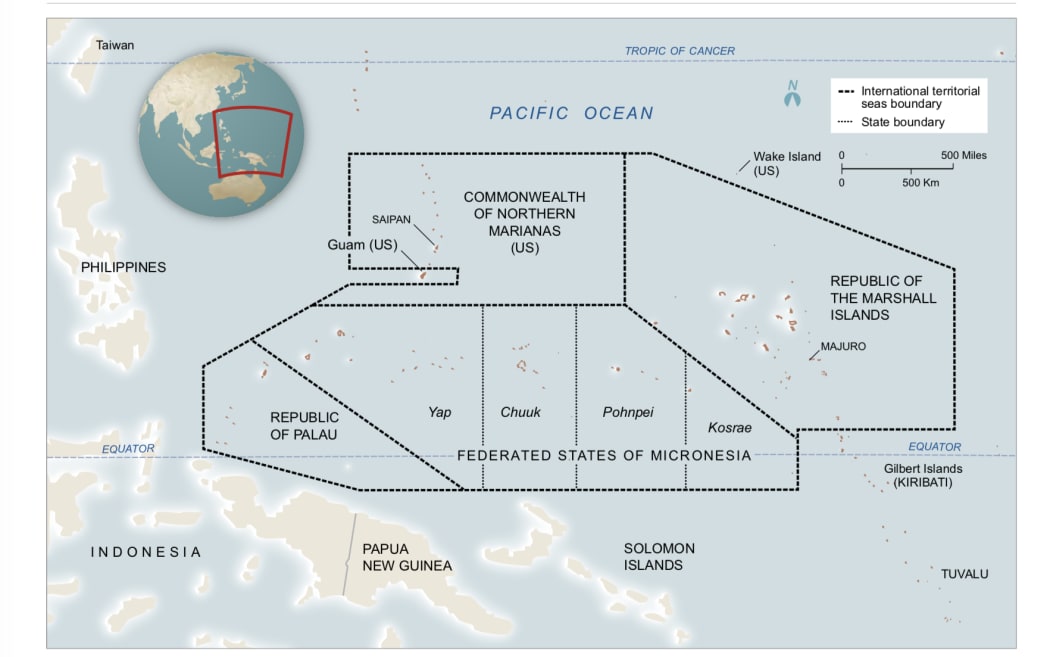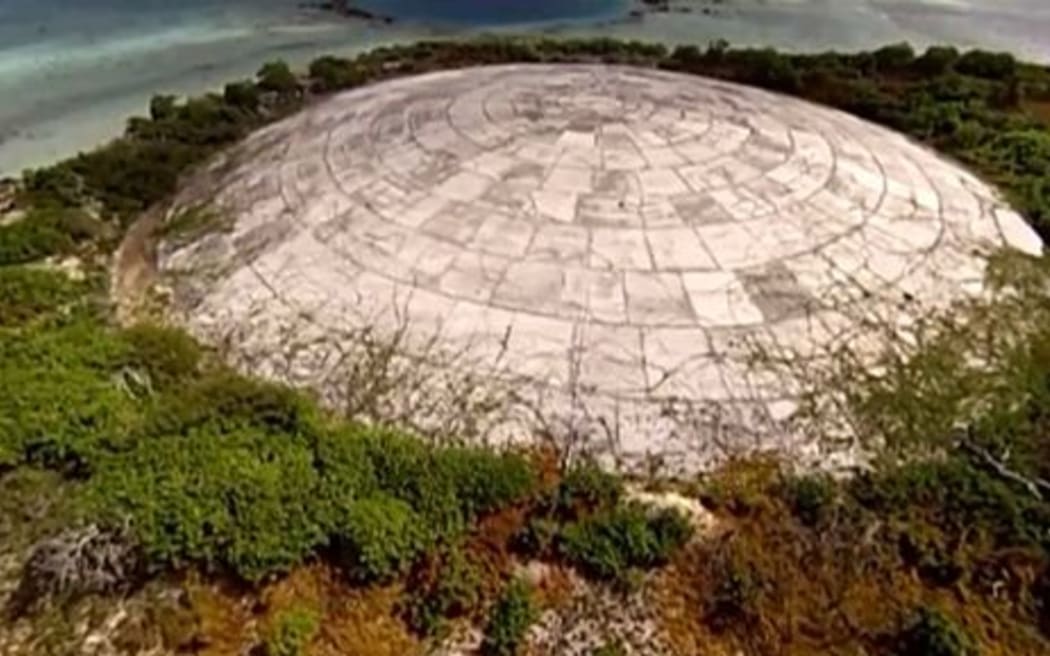By Giff Johnson, editor of the Marshall Islands Journal and RNZ Pacific correspondent
On the eve of the US Pacific Islands Summit in Washington, a key ally in the region called off a scheduled negotiating session for a treaty Washington views as an essential hedge against China in the region.
The Marshall Islands and the United States negotiators were scheduled for the third round of talks this weekend to renew some expiring provisions of a Compact of Free Association when leaders in Majuro called it off, saying the lack of response from Washington on the country’s US nuclear weapons testing legacy meant there was no reason to meet.
Marshall Islands leaders have repeatedly said the continuing legacy of health, environmental and economic problems from 67 US nuclear tests from 1946-1958 must be satisfactorily addressed before they will agree to a new economic package with the US.
Washington sees the Compact treaties with the Marshall Islands, Federated States of Micronesia, and Palau, which stretch across an ocean area larger than the continental US, as key to countering the expansion of China in the region.
“The unique security relationships established by the Compacts of Free Association have magnified the US power projection in the Indo-Pacific region, structured US defense planning and force posture, and contributed to essential defense capabilities,” said a new study released September 20 in Washington, DC by the United States Institute of Peace, “China’s Influence on the Freely Associated States of the Northern Pacific.”
China’s naval expansion is increasing the value of the US relationship with the freely associated states (FAS).

China’s blue water ambitions
China’s naval expansion is increasing the value of the US relationship with the freely associated states (FAS).
“The value of the buffer created by US strategic denial over FAS territorial seas is poised to increase as China seeks to make good on its blue water navy ambitions and to deepen its security relationships with Pacific nations,” said the report whose primary authors were Admiral (Ret.) Philip Davidson, Brigadier-General (Ret.) and David Stilwell, former US Congressman from Guam Dr Robert Underwood.

“As Washington seeks to limit the scope of Beijing’s influence in the Indo-Pacific in concert with regional partners, the US-FAS relationship functions as a key vehicle for reinforcing regional norms and democratic values.”
US and Marshall Islands negotiators have both said they hope for a speedy conclusion to the talks as the existing 20-year funding package expires on September 30, 2023. But the nuclear test legacy is the line in the sand for the Marshall Islands.
“The entire Compact Negotiation Committee agreed — don’t go,” said Parliament Speaker Kenneth Kedi, who represents Rongelap Atoll, which was contaminated with nuclear test fallout by the 1954 Bravo hydrogen bomb test at Bikini Atoll and other weapons tests.
“It is not prudent to spend over $100,000 for our delegation to travel to Washington with no written response to our proposal. We are negotiating in good faith. We submitted our proposal in writing.” But he said on Friday, “there has been no answer or counter proposal from the US.”
US and Marshall Islands officials had been aiming to sign a “memorandum of understanding” at the summit as an indication of progress in the discussions, but that now appears off the table.
US Pacific summit
Marshall Islands President David Kabua, who is currently in the US following a speech to the United Nations General Assembly Tuesday last week, is scheduled to participate in the White House-sponsored US Pacific Islands Summit on September 28-29.
Kabua, while affirming in his speech at the UN that the Marshall Islands has a “strong partnership” with the US, added: “It is vital that the legacy and contemporary challenges of nuclear testing be better addressed” (during negotiations on the Compact of Free Association). “The exposure of our people and land has created impacts that have lasted – and will last – for generations.”
The Marshall Islands submitted a proposed nuclear settlement agreement to US negotiators during the second round of talks in July. The US has not responded, Kedi and other negotiating committee members said Friday in Majuro.
In response to questions about the postponement of the planned negotiating session, the State Department released a brief statement through its embassy in Majuro.
“With respect to the Compact Negotiations, which are ongoing, both sides continue to work diligently towards an agreement,” the statement said. “Special Presidential Envoy for Compact Negotiations, Ambassador Joe Yun, is expected to meet with President Kabua while he is in Washington to continue to advance the discussions.”
While the Marshall Islands decision to cancel its negotiating group’s attendance at a scheduled session in Washington is a blow to the Biden administration’s efforts to fast-track approval of the security and economic agreement for this strategic North Pacific area, island leaders continue to describe themselves as part of the “US family.”
“The cancellation of the talks indicates the seriousness of this issue for the Marshall Islands,” said National Nuclear Commission Chairman Alson Kelen. “This is the best time for us to stand up for our rights.”
‘Fair and just’ nuclear settlement
For decades, the Pacific Island Forum countries that will be represented at this week’s leader’s summit in Washington have stood behind the Marshall Islands in its quest for a fair and just nuclear settlement, said Kelen, who helped negotiators develop their plan submitted recently to the US government for addressing lingering problems of the 67 nuclear tests.
“We live with the problem (from the nuclear tests),” said Kelen, a displaced Bikini Islander. “We know the big picture: bombs tested, people relocated from their islands, people exposed to nuclear fallout, and people studied. We can’t change that. What we can do now is work on the details for this today for the funding needed to mitigate the problems from the nuclear legacy.”
Kedi said he was tired of US attempts to argue over legal issues from the original Compact of Free Association’s nuclear test settlement that was approved 40 years ago before the Marshall Islands was an independent nation.
That agreement, which provided a now-exhausted $150 million nuclear compensation fund, was called “manifestly inadequate” by the country’s Nuclear Claims Tribunal, which over a two-decade period determined the value of claims to be over $3 billion.
“Bottom line, the nuclear issue needs to be addressed,” Kedi said.
“We need to come up with a dignified solution as family members. I’ve made it clear, once these key issues are addressed, we are ready to sign the Compact tomorrow.”
President Kabua is scheduled to participate in the White House-sponsored US Pacific Islands Summit on September 28-29.
Meanwhile, the members of his Compact negotiating team are in Majuro waiting for a response from the US government to their proposal to address the nuclear legacy.
This article is republished under a community partnership agreement with RNZ.
This post was originally published on Asia Pacific Report.